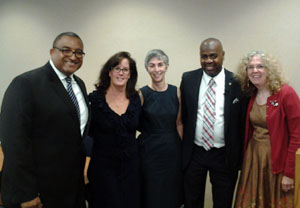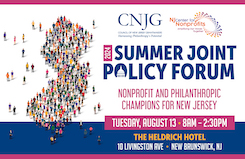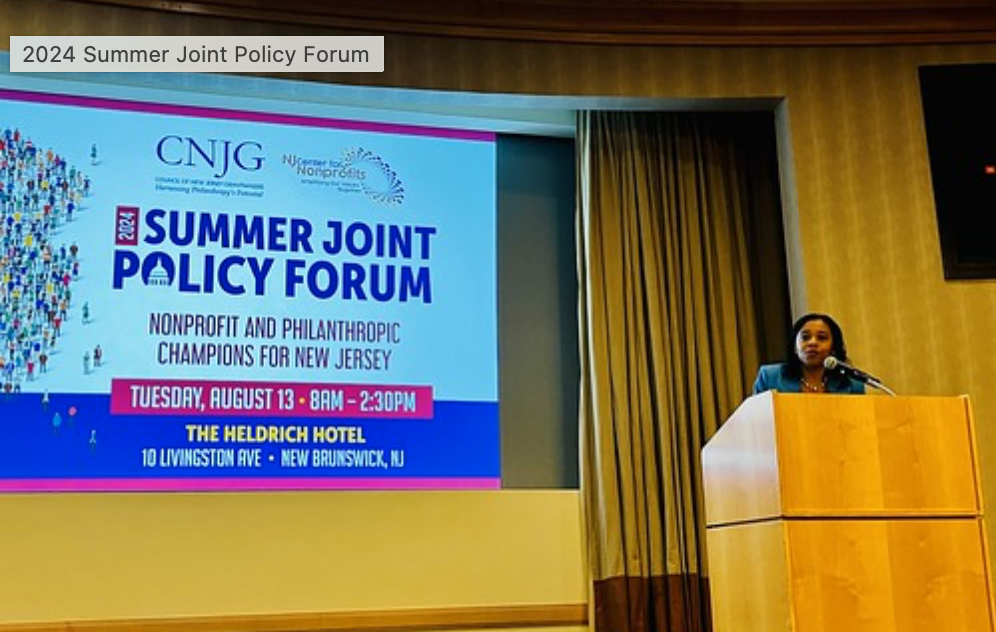Site Search
- resource provided by the Forum Network Knowledgebase.
Search Tip: Search with " " to find exact matches.
Get the complete 2024 Joint Policy Forum Resource List including a printable Agenda on the New Jersey Center for Nonprofits website.
Conference Photos
In this second session of GCIR’s Anti-Authoritarian Funder Learning Series, we will lean into the wisdom of advocates, pro-democracy funders, and influential thinkers to unpack the patterns of autocratic governance taking hold in the United States, and explore how philanthropy can help avert our democracy’s decline.
While broad swaths of the American public are grappling with the unmistakable and fearful evidence of our authoritarian drift, the good news is that we do not have to go it alone. The backsliding of democratic norms, attacks on civil society, and centralization of abusive executive power is a story that has played out countless times in fledgling and long-standing democracies alike. The brave, strategic, and resilient resistance of everyday citizens in those countries—along with the documentation and analysis of journalists and historians—offers us not just an understanding of the authoritarian playbook (such as vilifying migrant communities to rationalize immigration enforcement), but a roadmap out of it.
Join us as we learn from international advocates, as well as pro-democracy funders and advocates. Together, we will examine the strategies that have been deployed globally against democratic repression—and, crucially, how philanthropy can resource the movement infrastructure needed over the next 18 months to prevent the consolidation of autocratic rule in the United States.
The Council of New Jersey Grantmakers’ offers listserve services as a benefit of CNJG membership.
CNJG’s listserves facilitate ongoing group e-mail discussions among subscribed members. Members can share information and expertise, ask questions, and gather opinions of colleagues across the network. Listserves also enable members to get the most up-to-date information on related programs being offered throughout the field.
CNJG initially assigns new members to relevant listserves based on your submitted member profile. Contact Craig Weinrich to join any other listserve that interests you. You can unsubscribe from a listserve at any time by using the link found at the bottom of each email sent via the listserve.
In May 2024, our listserve provider updated its email engine, and now the automatic de-duping feature is no longer available, so sending an email to more than one listserve results in multiple emails to the recipient.
If you send an email to a listserve, and it bounces back to you, you are not on that listserve. Please contact Craig to add you to that listserve.
The listserves available are:
Camden Funders - [email protected]
Bergen Funders - [email protected]
Community Foundation CEO’s - [email protected]
CNJG Member CEO's - [email protected]
CNJG Member CFO’s and Finance Managers - [email protected]
CNJG Member Communications Staff - [email protected]
Corporate Funders - [email protected]
COVID-19 Funders - [email protected]
Culture Funders - [email protected]
Disaster Response Funders - [email protected]
Education Funders - [email protected]
Emerging Leaders in Philanthropy - [email protected]
Environmental Funders - [email protected]
Family Funders - [email protected]
Food Funders - [email protected]
Health Funders - [email protected]
Monmouth & Ocean Roundtable of Funders - [email protected]
Newark Funders - [email protected]
New Jersey Census Funders - [email protected]
Paterson Funders - [email protected]
Racial Equity Funders - [email protected]
STEAM Funders - [email protected]
South Jersey Funders - [email protected]
Strong & Thriving Communities - [email protected]
Trenton Area Funders - [email protected]
There are some restrictions for joining listserves:
· only CEOs (or equivalent) can join the CEO listserve;
· only CEOs (or equivalent) of a Community Foundation can join the Community Foundation CEO listserve;
· only CFOs (or equivalent) can join the Financial listserve
· only family foundation staff and trustees can join the Family Funders listserve;
· only corporate giving professionals can join the corporate listserve
Please refer to the Listserves’ Membership Policies below for information on using the listserves.
Late last year, the Texas legislature passed a series of bills targeting migration at the Texas-Mexico border. This included Senate Bill 4 (SB4), which criminalizes anyone suspected of crossing the border without authorization to enter or re-enter into Texas. Since then, a series of legal decisions have created confusion and uncertainty. Similarly, Florida has passed legislation targeting community IDs and driver's licenses for immigrants and criminalizing the transportation of undocumented immigrants into the state.
As battleground border states, Florida and Texas have had an immense influence across the country, as other states have stood up similar anti-immigrant bills. Most recently the governor of Iowa signed SF2340, a bill which made it a state crime for immigrants with prior deportation orders from the U.S. to reside in the state. The Louisiana governor recently introduced SB 388, which, as in Florida, criminalizes undocumented immigrants entering or reentering the state. Meanwhile, Georgia has introduced legislation to punish local governments for having sanctuary city policies.
In an election year when immigration is the top issue in the minds of many voters, these policies exacerbate xenophobic, anti-immigrant, and racist sentiments that further dehumanize and criminalize immigrant and refugee communities while also expanding state powers to detain, deport, and terrorize undocumented individuals. To respond to this moment, organizations are leveraging different strategies–from litigation to organizing–to prevent the implementation of these policies and create a more welcoming country for all.
Join us for a panel conversation with frontline leaders, which will be followed by a funder-only discussion.
Speakers
Jennefer Canales-Pelaez, Texas Policy Attorney & Strategist, Immigrant Legal Resource Center (ILRC)
Erica Johnson, Founding Executive Director, Iowa Migrant Movement for Justice (Iowa MMJ)
Dauday Sesay, Founder & Executive Director, Louisiana Organization for Refugees and Immigrants (LORI) & National Network Director, African Communities Together (ACT)
Moderator
Cairo Mendes, Senior Director of State and Local Programs, GCIR
This piece captures five key insights to guide organizations as they develop ongoing Measurement, Learning, and Evaluation plans to achieve greater social impact:
- Theory of Change amplifies your impact—helping you focus on the linkages between, and assumptions underlying, your strategies and outcomes.
- Progress toward long-term goals is observable in interim measures.
- Setting targets along the way forecasts your trajectory and provides feedback that tells you if you’re moving in the right direction.
- Impactful measurement needs to align with the rhythm of your work and provide the right data at the right times.
- The payoff of measurement is in the practice, and putting that practice to use greatly increases your odds of success.
When confronted with measurement and evaluation, some turn first to the expensive and time-consuming practice of “gold standard” experimental designs requiring comparison groups to definitively prove whether an intervention delivers the expected results. While measurements of this type are reasonable in certain situations, they are often a stretch for the real world of social innovation and are limited in their timeliness, strategic value, cultural applicability, and validity for measuring the changes sought.
You can get more for less—by deploying measurement based on social science rigor and valuing adaptability and learning. In other words, social innovation is best measured in real time and in ways that can be seamlessly woven into the rhythm of the business cycle and the daily practices of those responsible for funding, managing, and implementing social change.

New Jersey Community Capital, the state’s largest community development financial institution, announced Tuesday that it has donated a total of $50,000 to the municipalities of Newark, Paterson, Camden, Trenton and New Brunswick.
Each of the five municipalities will receive $10,000 in funding for specific community organizations or initiatives focused on economic development, youth programs, public health and more. The donation is part of NJCC’s commitment to this year’s Martin Luther King Jr. Day celebration theme: “It starts with me: cultivating a beloved community mindset to transform unjust systems.” NJCC CEO Bernel Hall said the organization feels the donations will have great impact.
In honor of the life, legacy and impact of Dr. Martin Luther King Jr. and Coretta Scott King, New Jersey Community Capital invites you to join it in furthering NJCC’s mission of promoting equitable opportunities for all.
“We’re thrilled to be able to build on Dr. King’s mission and integrate it into our work throughout New Jersey and support such well-deserving community organizations and impactful programming,” he said. “These cities are doing crucial work to make New Jersey the best it can be, and partnering with them to do even more will provide better outcomes and opportunities for residents.” Hall said NJCC’s charitable giving corresponds to its work across the state to finance the predevelopment, acquisition, construction, rehabilitation and mini-permanent needs of affordable housing units for ownership and rental opportunities. NJCC’s lending takes a holistic and equitable approach by financing projects that use the diverse pillars of a community, including small businesses, commercial office and retail spaces and early childhood education centers.
The Princeton Area Community Foundation has awarded a total of $250,000 in grants to local nonprofits for summer initiatives that reach children and teens, including many whose families would not otherwise have access to affordable, high-quality programs when school is not in session.
The grants, funded through the Community Foundation’s Community Impact program, will support 26 summer programs that provide a wide variety of ac
tivities for young people, including arts instruction, academic enrichment, social-emotional learning opportunities, swimming and sports lessons. Many programs also provide transportation and meals. Some initiatives include bilingual instruction. Some are geared toward populations that may be difficult to reach, such as tweens and teens.
For many families, summer programs serve as safety nets that help working parents. But for many families, the programs are often out of reach, because of affordability or accessibility.
“Summer programs help reduce learning loss and provide much needed support for many working families who otherwise would not be able to enroll their children in quality, summer activities during the summer months,” Nelida Valentin, Community Foundation vice president of grants and programs, said. “These grants help nonprofit partners sustain terrific initiatives that serve some of our most vulnerable children, particularly teens and tweens in this region. We also want to thank our generous donors, whose support of our Community Impact grants program helps make these grants possible.”
The Disability & Philanthropy Forum invites you to register for the 2024 Disability & Philanthropy Webinar Series. All of our 2024 webinars will be open to the public. This collective learning journey will focus on why a disability lens is essential to addressing key social justice issues. Each webinar will engage philanthropic leaders in conversation with disability advocates about how we can move toward a more equitable, inclusive future for all.
Disability Rights Activism and Organizing: April 11 - 1:00 - 2:00 p.m. ET
Grantmaking for Disability: LGBTQIA+ Funding: May 9 - 1:00 - 2:00 p.m. ET
Disability Pride, Joy, and Visions for the Future: July 11 - 1:00 - 2:00 p.m. ET
Disability and the Care Economy: September 19 - 1:00 - 2:00 p.m. ET
Disability-Inclusive Hiring: October 10 - 1:00 - 2:00 p.m. ET
Disability in Indigenous Communities: November 14 - 1:00 - 2:00 p.m. ET
All webinars are open to the public, so feel free to share with anyone you know that's interested in learning about disability inclusion, rights, and justice.
CART will be provided. If you require another accommodation to fully participate in the webinar, please note it in your registration, or contact us at [email protected].


